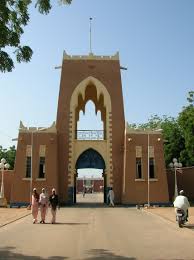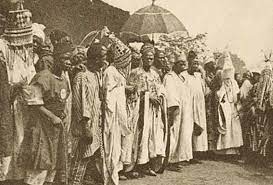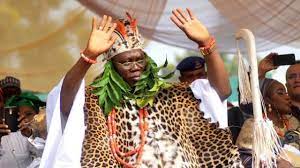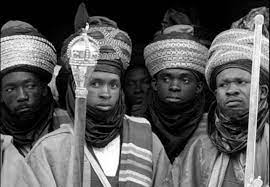
Muhammadu Sanusi II (to be referred to as Sanusi in the course of this write-up) was born on the 31st of July 1961. His religious title is Khalifa Sanusi II. He was born into a royal family of Kano and this qualifies him to be a potential, emir of Kano.
Sanusi is the grandson of Muhammadu Sanusi I and he had a great relationship with his grandfather while the latter was alive. Sanusi learned the Quran as a young boy and then got enrolled at the St Annes Primary School in Kaduna.
He later got admitted to King’s College from where he graduated in 1977. Sanusi later proceeded to the Ahmadu Bello University.
After his NYSC in Yola, he went for his master’s degree in Economics at Ahmadu Bellow University, Zaria. He later enrolled at the International University of Africa in Khartoum for Islamic studies.
His banking career started in 1985at Icon Limited, which is a subsidiary of Morgan Guaranty Trust and Barings Bank. He was later employed by the United Bank for Africa in 1997 and rose to become the general manager.
Sanusi also became executive director at First Bank of Nigeria in 2005 and was later promoted to the position of Chief Executive Officer in 2009, making him the first person from northern Nigeria to assume that position.
President Umaru Musa Yar-Adua nominated Sanusi as the Governor of Central Bank of Nigeria in 2009, 1st June to be precise. The Nigerian Senate confirmed his appointment 2 days later.
His role as the CBN governor was a landmark as he carried out a lot of reformation in the Nigerian banking sector. In fact, he was recognized by The Banker magazine as the 2010 Central Bank of Governor of the Year.
His roads to the palace
The late Emir of Kano, Ado Bayero, died in 2014 after more than 5 decades as the Emir of Kano. Following a leadership crisis that took place shortly after, Sanusi was appointed the new emir on the 8th of June, 2014.
Even his appointment was greeted with a lot of protest from opposition supporters of the son of the erstwhile Emir of Kano, Chiroman Kano. There was a general belief then that Sanusi was able to ascend the throne because Governor Rabiu Kwankwaso played a major role in the entire process.
Despite the protests that greeted his appointment, he ascended the throne without further ado and the uproar was claimed shortly afterward.
There were even strong indications that his appointment as emir of Kano was to protect him from prosecution for his alleged corrupt practices as the CBN governor. Then he was crowned as the Emir of Kano on the 9th of June, 2014, making him the 57th individual to ascend the throne.
Shortly after ascending the throne, Sanusi urged his supporters to stand against Boko Haram and this was replied with the bombing of a mosque in Kano by the terrorist organization. The bombing led to over 150 causalities.
Then in December 2014, Sanusi was accused by the then Boko Haram leader of deviating from Islamic standards, while Sanusi replied by likening the Boko Haram leader to the Maitatsine, a heretical Islamic preacher.
His dethronement
Sanusi reigned for six years as the Emir of Kano. He became a charismatic figure and he usually clashed with tradition, tending more towards modernity. He even drafted a new Muslim family law as the emir of Kano. Additionally, he completed a library big enough to accommodate 40,000 books. He equally got involved in vernacular modernization in the palace. During his reign, there was an international promotion of the Dubar festival in his effort to take tourism to the next level.
Sanusi became critical of the Kano state government and this was seen as against royal tradition. He accused the Kano State government of misplaced priority. He was equally subjected to investigation by the emirate council to investigate the accusation of financial irregularities against him.
Many believe that the so-called financial irregularities investigation was because of the comment he made against the Kano State government. The state legislature later called off the investigation.
Then the Kano State governor, Abdullahi Umar Ganduje, divided the Kano emirate into 5 emirates, which are Kano, Rano, Bichi, Karaye, and Gaya. The purpose was to whittle down the power of the Emir of Kano. As a result of the new creation, the Emir of Kano would only bear rule over 10 out of the 44 local governments in Kano state.
Then a new investigation over violation of traditional practices was launched in 2020 by the Kano state legislature against Sanusi. His dethronement by Governor Abdullahi Ganduje occurred on the 9th of March 2020. Sanusi got the news of his removal at Gidan Rumfa, where his private residence is located. His deposition letter was presented to him by a contingent of security operatives, including military and police.
Sanusi did not contend the dethronement, but rather accepted it in good faith, saying it is the will of Allah. He addressed his supporters, telling them to not cause any problem but to remain calm over the issue. Bear in mind that his grandfather was also deposed in 1963 after which he was sent on exile.
On his part, he was exiled to Nassarawa state after his request to be exiled to Lagos was denied. Then Sanusi was sent on exile under heavy guard and he flew out of Kano state via a military airbase. However, his lawyers insisted that they would challenge the case in court. As of today, Sanusi is currently exiled to a remote local government in Nassarawa state, Awe. He was later allowed to depart for Lagos following the order of a Federal High Court sitting in Abuja.
Sanusi has made up his mind not to challenge the dethronement and later visited the African Studies Centre of the University for a one-year academic fellowship in October 2020. He said he would write a book about what happened under his leadership as CBN governor. He also said he would never consider venturing into politics but prefer rather become an academician.
In the course of his professional years, Sanusi has made an impact in virtually every field he ventured into and still plans to make even more impacts in the future, especially in the academic world.






















